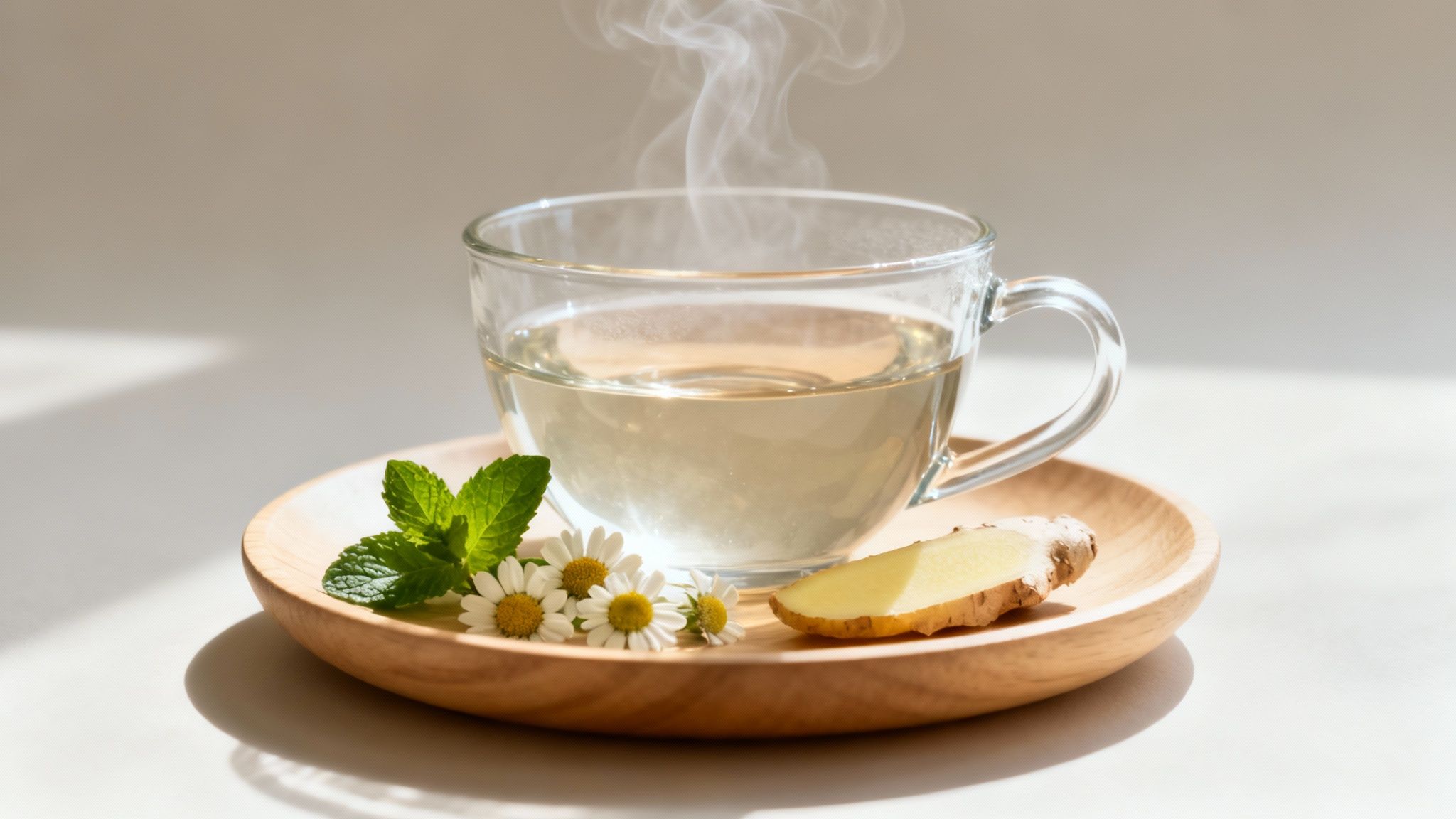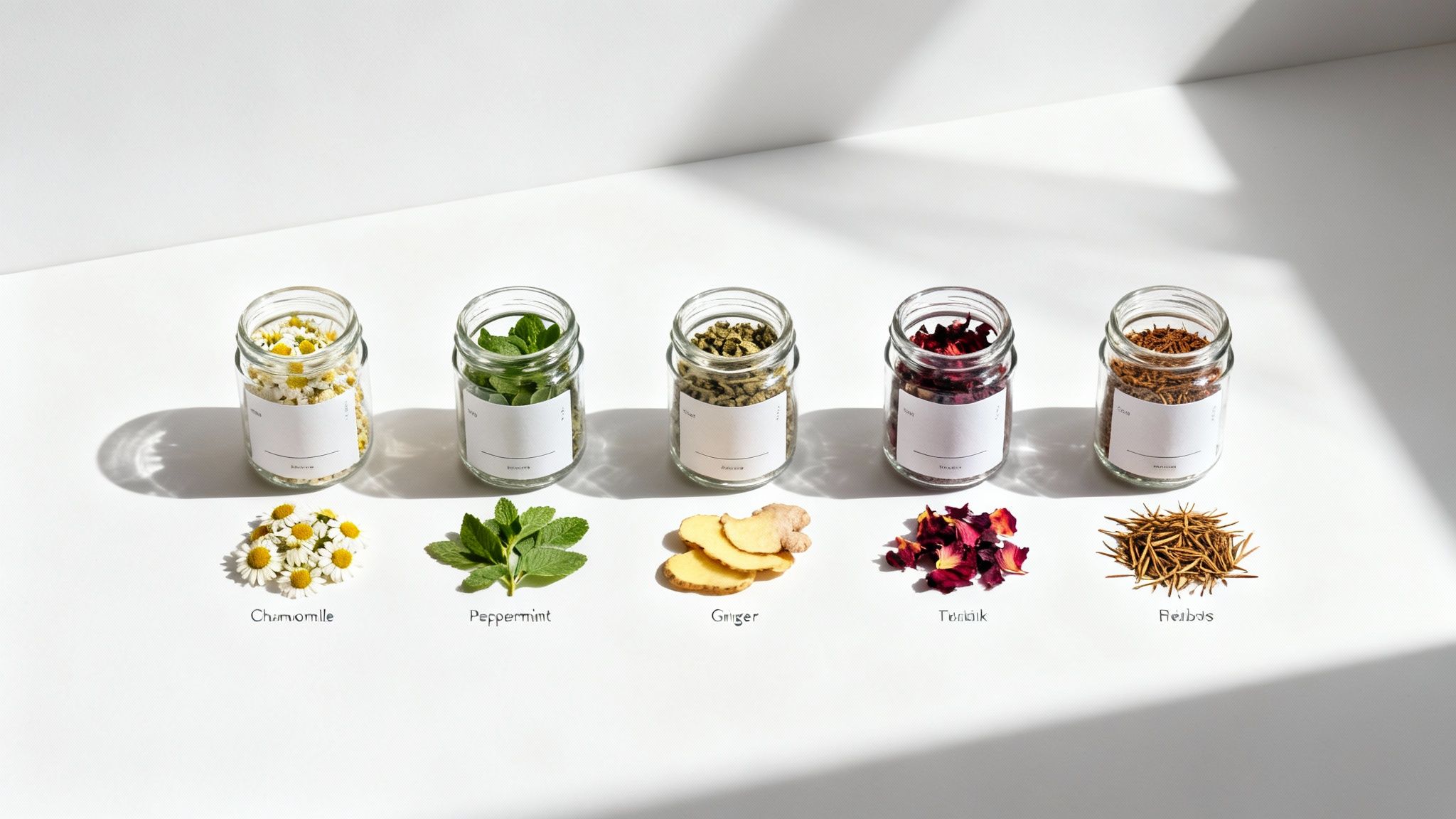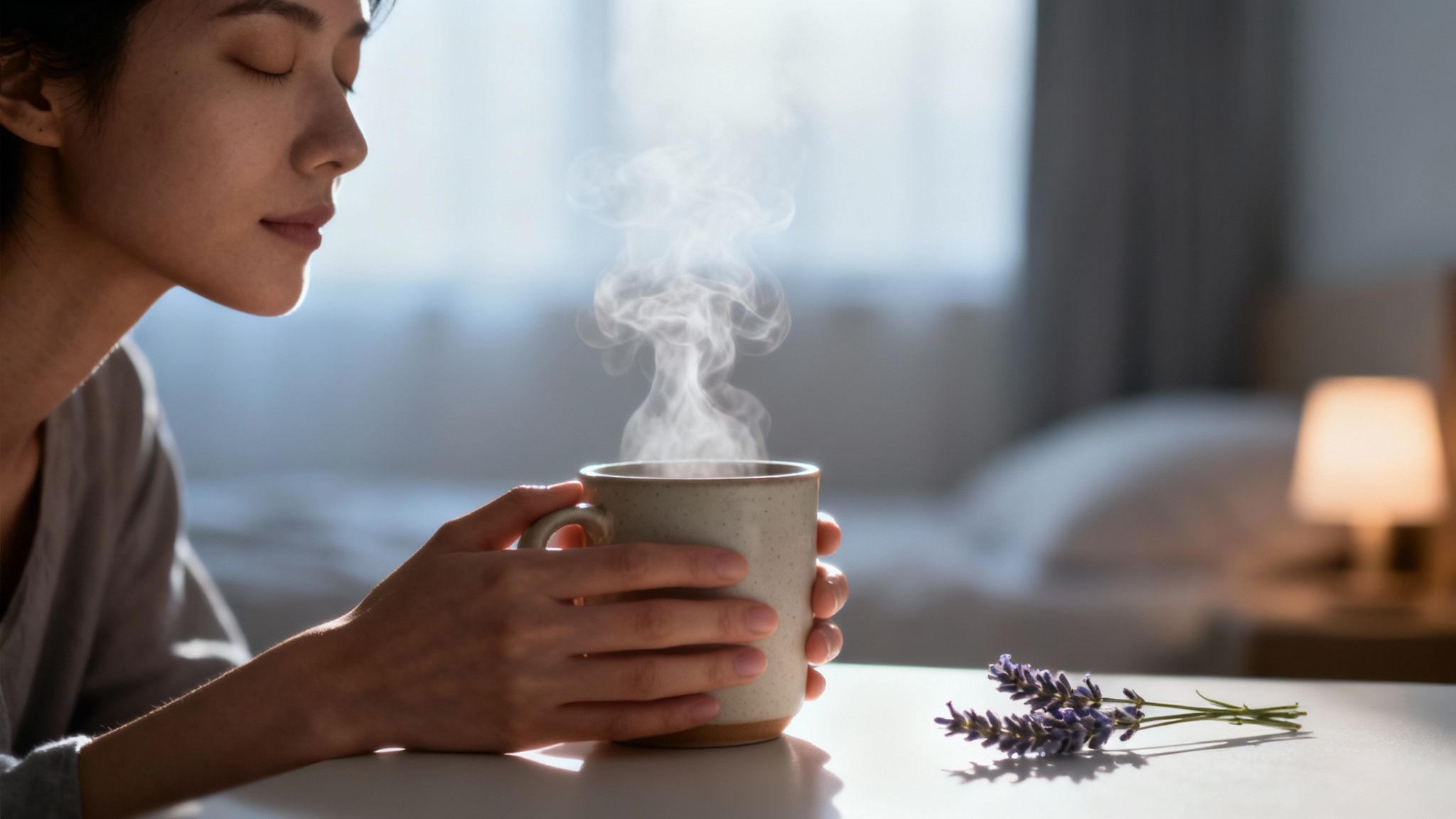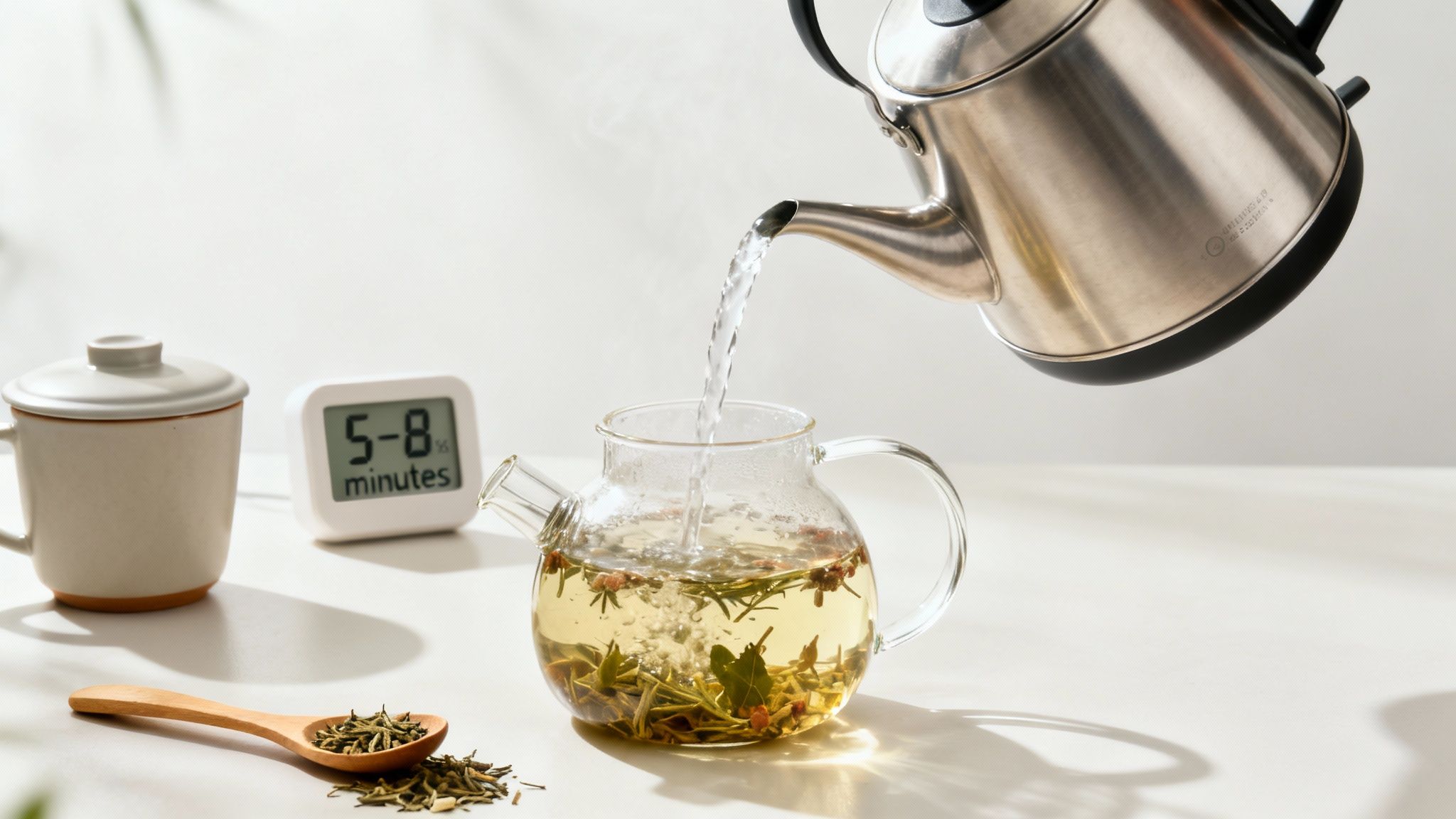When you hear the term 'caffeine-free herbal tea', you're actually talking about what's technically known as a 'tisane'. These are wonderful, aromatic infusions made from a whole host of botanicals – think flowers, roots, spices, and leaves – but not from the traditional tea plant itself.
Unlike your usual black or green tea, these brews are naturally free from caffeine. This makes them a soothing, flavourful alternative for anyone looking to relax and unwind, any time of day or night.
A Gentle Introduction to Herbal Teas

Picture a warm, comforting cuppa that calms your mind without giving you that familiar caffeine buzz. That's the simple beauty of herbal tea in a nutshell.
These drinks aren't really 'teas' in the classic sense, because they don't come from the Camellia sinensis plant – the source of every caffeinated tea you've ever had. Instead, they’re simply infusions, created by steeping all sorts of different botanicals in hot water.
This is a really important distinction to make. While decaffeinated teas have had their caffeine stripped out through a chemical process, herbal infusions never had any caffeine in them to begin with. It’s this completely natural composition that has so many people turning to caffeine-free herbal teas as part of a more mindful, health-conscious lifestyle.
If you're curious about the nitty-gritty, you can learn more about the specifics in our guide to the caffeine content in teas.
Why Are Herbal Teas So Popular?
The love for herbal infusions has absolutely skyrocketed, becoming a comforting daily ritual for millions. You can see this trend everywhere in the UK, where people are more health-aware than ever.
While the total UK tea market is huge, generating around £1.7 billion in 2024, it's the herbal corner of that market that's seeing incredible growth as more of us move away from traditional black teas.
This boom is really all about a collective desire for gentler, more natural ways to look after ourselves. People are picking up these brews for a few key reasons:
- Relaxation and Stress Relief: Herbs like chamomile and lavender are famous for their incredibly calming properties.
- Digestive Support: Everyone knows a cup of peppermint or ginger can work wonders for soothing an upset stomach.
- Improved Sleep: A warm, gentle brew before bed can be the perfect signal to your body that it's time to switch off and wind down.
In essence, herbal tea offers a simple yet powerful act of self-care. It's a way to pause, hydrate, and enjoy a moment of tranquillity, making it more than just a drink—it's a small, meaningful addition to a balanced day.
Diving Into the World of Herbal Teas

When you move beyond traditional tea, a whole world of flavour and wellness opens up. Herbal teas, or tisanes, are a fantastic way to tap into centuries of plant wisdom, one soothing sip at a time.
Chamomile is probably the most famous of the bunch, a go-to for winding down before bed. It’s not just an old wives' tale; compounds in the flower, like apigenin, gently bind to receptors in the brain, helping to quiet a busy mind.
“People have been turning to chamomile for over 2,000 years to calm the nervous system and encourage rest.”
Peppermint for a Happy Tummy
There's something incredibly refreshing about peppermint tea. That lively, cooling taste is more than just a treat for your senses; it’s a sign of the menthol at work.
Menthol has a brilliant knack for relaxing the muscles in your digestive tract. This makes it a fantastic after-dinner drink to help ease bloating and keep everything feeling comfortable.
- Sip it after a heavy meal to help things settle.
- Try it iced on a warm afternoon for a proper pick-me-up.
- You can even blend it with a bit of green tea for a minty, caffeinated twist.
Ginger for a Warming Kick
Nothing feels quite like a warm hug in a mug like a cup of spicy ginger tea. That signature heat comes from gingerol, its main active component, which is fantastic for stimulating circulation and soothing an upset stomach.
It's a wonderful travel companion, especially if you're prone to a bit of queasiness. A warm brew before a flight can make all the difference.
- Drink a cup before travelling to help calm nausea.
- Add a spoonful of honey to soothe a scratchy throat.
- It’s the perfect thing to sip on after a long walk in the cold.
To help you get started, here's a quick look at some of the most popular herbal infusions.
A Quick Guide to Popular Caffeine Free Herbal Teas
This table provides a snapshot of popular herbal teas, their flavour profiles, and primary associated benefits to help you choose your next brew.
| Herbal Tea | Common Flavour Profile | Primary Associated Benefit |
|---|---|---|
| Chamomile | Floral and mild | Promotes sleep and relaxation |
| Peppermint | Cool and refreshing | Supports digestion |
| Ginger | Spicy and warming | Eases nausea and boosts circulation |
| Hibiscus | Tart and fruity | High in vitamin C and antioxidants |
| Rooibos | Nutty and earthy | Rich in minerals and stress reduction |
It's a great starting point for finding a tea that not only tastes good but also does you a bit of good.
Hibiscus for a Tart Treat
With its stunning deep red colour and a tart, cranberry-like flavour, hibiscus tea is a real showstopper. That vibrant hue comes from anthocyanins, powerful antioxidants that are brilliant for your body.
A cup of hibiscus can help support cardiovascular health and fight inflammation, making it as good for you as it is delicious.
- It’s absolutely divine served chilled on a hot summer's day.
- Mix it with a bit of mint to balance out the tartness.
- Enjoy it in the evening as a flavourful, hydrating treat.
Rooibos for Earthy Calm
Hailing from South Africa, rooibos (or 'red bush') has a naturally sweet, nutty flavour that’s incredibly smooth. It's completely free of tannins, so it never gets bitter, no matter how long you brew it.
It's also packed with minerals like magnesium and zinc, which can help your body handle stress. Because it’s naturally caffeine-free, you can enjoy it any time of day without worrying about the jitters.
- It makes a wonderful caffeine-free latte with a splash of vanilla.
- Add a cinnamon stick for some extra warmth and spice.
- Serve it iced with a slice of fresh orange for a refreshing twist.
How to Choose Your Perfect Brew
Finding your favourite herbal tea is all about listening to your body and your taste buds. Think about what you need at that moment. Is it calm? Comfort? A bit of a boost?
A great way to discover what you like is to keep a little tea journal. Jot down which ones you try, what they taste like, and how they make you feel. It’s a simple but lovely way to tune in.
- Start with sample sizes or variety packs to find what you love.
- Pay attention to brewing times to get the best flavour.
- Don’t be afraid to rotate your selection – you might just find a new favourite.
Have fun with it! Exploring the world of herbal teas is a delicious journey. For a little guidance, you can always explore the curated blends from Jeeves & Jericho to get started.
The Wellness Benefits of a Caffeine-Free Cup

Choosing herbal tea is so much more than just ditching caffeine. It’s a conscious decision to look after yourself, a simple act of kindness towards your body and mind. Swapping your usual stimulating cuppa for a gentle infusion can make a real difference, especially when it comes to your body’s natural rhythm.
Think of caffeine as borrowing energy from tomorrow. It gets you through the moment, but the payback often arrives as jitters, restlessness, or that dreaded afternoon slump. Caffeine-free herbal teas walk a different path entirely, offering warmth, flavour, and comfort without messing with your system.
This little switch is especially powerful as the day winds down. A warm, fragrant brew can be the perfect signal to your brain that it’s time to shift gears, leave the day’s stresses behind, and prepare for a good night's sleep. It's a small ritual that can have a surprisingly big impact.
Supporting a Calm Mind and Body
It's no secret that many herbal infusions are brilliant for soothing a frazzled nervous system. Botanicals like lavender, lemon balm, and chamomile are packed with natural compounds that gently dial down feelings of tension and help you genuinely unwind.
These herbs work with your body, not against it. Unlike a sedative, they encourage a state of calm without making you feel drowsy, which makes them perfect for navigating the bumps of a busy day. That moment with a cup of tea becomes a chance to pause, take a breath, and reset. For instance, lemon verbena is another fantastic herb known for its calming properties. You can dive deeper into the ways it can help in our guide to lemon verbena health benefits.
By weaving these gentle botanicals into your daily routine, you're actively choosing to support your mental and emotional balance. It's a simple, enjoyable form of self-care that builds resilience against the pressures of modern life.
This focus on wellness is a massive reason for their growing popularity. In fact, somewhere between 20-25% of UK tea drinkers regularly reach for herbal infusions, often for their stress-busting and digestive perks. It's all part of a bigger shift towards more mindful, holistic health choices, with chamomile and peppermint leading the charge.
Aiding Digestive Wellness
Beyond just helping you relax, many caffeine-free herbal teas are fantastic allies for your digestive system. Infusions with herbs like fennel, ginger, and peppermint are famous for their ability to soothe and comfort an unhappy tummy.
These botanicals can help in a few different ways:
- Ginger is brilliant for settling nausea and bringing a gentle warmth to the digestive tract.
- Fennel can be a great help when you're feeling bloated and uncomfortable after a meal.
- Peppermint is well-known for relaxing the stomach muscles, which helps everything move along smoothly.
Sipping a cup after you eat isn't just a cosy ritual; it's a practical way to support your body's natural processes. Good gut health is a cornerstone of overall wellbeing, and herbal teas are a delicious and easy way to give it a helping hand.
How to Brew the Perfect Herbal Tea

Getting the absolute best out of your favourite caffeine-free herbal teas is much easier than you might think. Unlike delicate green or white teas that turn bitter if you even look at them with water that’s too hot, most herbal infusions are wonderfully forgiving. In fact, they love boiling water. That heat is exactly what’s needed to draw out their deep, vibrant flavours and all those beneficial compounds.
Brewing is a gentle art, turning a simple task into a mindful ritual. When you give your herbs the right environment, you let them express their true character, transforming your cup from just a drink into a properly restorative moment.
The Essentials of Steeping
The secret to a brilliant brew comes down to just a few key things: the water temperature, how long you let it steep, and whether you go for loose-leaf or tea bags. Each one plays a big part in the final taste and aroma.
For most herbal teas, the rule is refreshingly simple: use freshly boiled water, right around 100°C (212°F). This high heat is your best friend for breaking down tougher bits like ginger root or dense hibiscus flowers, ensuring you get a really potent, full-bodied infusion.
The perfect steep is a beautiful balance of time and temperature. Boiling water gets things started, but the real magic happens as the herbs infuse, lending their very essence to the water.
Once the water's in, time is your most important ingredient. Herbal teas generally need a bit more patience than their traditional counterparts to release all their goodness.
- Optimal Steeping Time: Give it a good 5–10 minutes. Lighter botanicals like chamomile might be lovely after five, but woody roots like ginger will thank you for the full ten.
- Cover Your Cup: Pop a lid on your mug or teapot while it steeps. It’s a small step, but it traps all those precious aromatic oils that carry so much of the flavour and therapeutic properties, stopping them from vanishing with the steam.
Loose-Leaf Versus Tea Bags
The old debate between loose-leaf and tea bags really just boils down to what you fancy, but there are some real differences. Loose-leaf teas, with their larger, whole pieces, have more space to unfurl and infuse. This often leads to a more complex and nuanced flavour. If you're keen to get this right, our guide on how to brew loose leaf tea has all the steps.
Tea bags, of course, offer pure convenience. These days, high-quality pyramid bags are a fantastic middle ground, giving the leaves much more room to breathe than traditional flat bags.
Whichever path you choose, the core principles of piping hot water and a generous steep time hold true. And for an extra special touch, why not add a slice of lemon, a spoonful of local honey, or a cinnamon stick? It’s a lovely way to make your comforting cup completely your own.
Finding Your Perfect Brew: How to Choose Ethical, High-Quality Herbal Teas
Stepping into the tea aisle can sometimes feel like a bit of a maze, can't it? But figuring out the best caffeine free herbal teas gets a whole lot easier once you know what to look for. It’s not just about finding a delicious flavour; it's about choosing something that’s genuinely good for you and for the planet.
The secret to an incredible herbal tea lies in its ingredients. You want to see whole, recognisable bits of herbs, flowers, and spices. Think proper chamomile flowers, chunky pieces of ginger, or whole peppermint leaves. When you can see what you’re brewing, you know you're getting the real deal – the plant’s true, unadulterated essence.
Choosing teas with whole ingredients over those with artificial flavourings is the difference between sipping a genuine botanical infusion and a tea-flavoured drink. The former offers a more complex taste and ensures you receive the full wellness properties of the herbs.
This focus on purity is really what separates a good cup of tea from a great one.
Reading the Labels: Your Guide to a Better Cup
Getting to grips with the labels on a tea box is the best way to make a choice you feel good about. Certifications like 'Organic' and 'Fair Trade' aren't just marketing fluff; they signal a real commitment to quality and ethics.
- Organic: This little seal of approval means the herbs were grown without any synthetic pesticides or fertilisers. It’s better for you, and it’s certainly better for the soil and the people growing them.
- Fair Trade: Spotting this label means the farmers who nurtured the herbs received a fair price for their work. It’s all about supporting better living standards and helping communities thrive.
If you’re really passionate about where your tea comes from, looking into permaculture gardening principles offers a fascinating glimpse into the world of self-sustaining agriculture. It’s a philosophy that many of the best ethical herb growers are embracing.
Beyond the Brew: The Importance of Sustainable Practices
It’s not just what’s inside the box that matters; the packaging tells a story too. As we all become more conscious of our environmental footprint, UK herbal tea brands are stepping up with eco-friendly packaging and transparent sourcing.
Keep an eye out for brands using biodegradable tea bags, recyclable boxes, and minimal plastic. When you choose to support companies that are open about their practices and prioritise sustainability, every cup you brew becomes a small, positive contribution. It ensures your moment of calm is pure, potent, and thoughtfully made, right from the plant to your cup.
A Few Final Questions About Herbal Tea
As you get ready to dive into the wonderful world of caffeine-free herbal teas, it’s completely normal to have a few questions. This is where we tie everything together, answering some of the most common queries we hear so you can choose, brew, and sip with total confidence.
Think of it as a friendly chat over a cuppa, clearing up those last little details. From caffeine content to keeping your leaves fresh, let's get you sorted.
Are All Herbal Teas Completely Caffeine-Free?
This is the big one, isn't it? For the most part, the answer is a wonderfully simple 'yes'. True caffeine-free herbal teas—often called tisanes—are naturally, 100% caffeine-free. That’s because they aren’t made from the tea plant (Camellia sinensis) at all, but from flowers, roots, herbs, and spices that never had any caffeine to begin with.
That said, it always pays to glance at the ingredients list. Some blends out there, while they might seem herbal, can sometimes include ingredients like yerba mate or guarana, which pack a caffeinated punch. If a trusted brand labels something a "caffeine-free herbal tea," you can be pretty certain that’s exactly what you’re getting: a pure, gentle brew with absolutely zero caffeine.
Can I Drink Herbal Tea Every Day?
For most of us, enjoying herbal tea daily is a lovely, healthy ritual. A cup or three of gentle infusions like chamomile, peppermint, or ginger is a fantastic way to stay hydrated and soak up their soothing benefits. These are generally considered very safe for daily sipping.
It's worth remembering, though, that some herbs are a bit more potent and could potentially interact with medications or certain health conditions.
It’s always a good idea to have a quick chat with your doctor before making any herbal tea a firm daily habit. This is especially true if you are pregnant, breastfeeding, or managing an ongoing health issue. It just ensures your tea ritual is both a pleasure and perfectly safe for you.
What’s the Difference Between Herbal and Decaf Tea?
Ah, a brilliant question that often catches people out. The real difference is all about where they start and what happens next. Think of it like this: one was born without a certain trait, while the other had it surgically removed.
- Herbal Tea: This is naturally caffeine-free. It’s an infusion of plants that simply never contained any caffeine in the first place.
- Decaffeinated Tea: This starts life as regular black or green tea, made from the naturally caffeinated Camellia sinensis plant. It then goes through a process to wash away most of that caffeine.
Even after the decaffeination process, a tiny trace of caffeine remains—usually around 1-2% of the original amount. A true herbal tea, on the other hand, contains 0% caffeine, making it the only choice if you’re looking to avoid the stimulant completely.
How Should I Store Herbal Tea to Keep It Fresh?
Proper storage is your secret weapon for preserving the flavour, aroma, and goodness of your herbal teas. Their biggest enemies are light, heat, and moisture, which can cause the delicate essential oils in the leaves and flowers to fade away.
To keep your teas tasting their absolute best, just follow these simple steps:
- Use an Airtight Container: Pop your tea into a proper tin, a ceramic jar, or even a dark glass container with a lid that seals well.
- Find a Cool, Dark Spot: A kitchen cupboard or pantry is ideal—just make sure it’s away from the oven, hob, or any sunny windowsills.
- Keep it Away From Strong Smells: Herbs are a bit like sponges and can easily pick up other aromas. It’s best to store them away from your spice rack or coffee beans.
When you store them right, your beautiful herbs and tea bags will stay fragrant and full of flavour for up to a year. Every cup will be as good as the first.
Ready to explore a world of authentic flavour and ethical sourcing? At Jeeves & Jericho, we are dedicated to bringing you the finest whole-leaf caffeine-free herbal teas, crafted with care and a commitment to quality. Discover your perfect calming cup by visiting us at https://www.jeevesandjericho.com.


